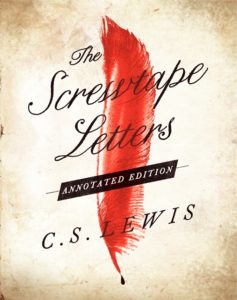 In preparation for a class I will be teaching on The Screwtape Letters at a local church from January to April next year, I knew I needed to get a new copy of the book, as mine was falling apart from decades of use. I settled on the annotated edition by Paul McCusker.
In preparation for a class I will be teaching on The Screwtape Letters at a local church from January to April next year, I knew I needed to get a new copy of the book, as mine was falling apart from decades of use. I settled on the annotated edition by Paul McCusker.
I know I must have read sometime the preface Lewis wrote for the 1961 edition of his classic, but if so, it has escaped my memory. Reading it yesterday, I received a fresh reminder (as if I needed another one) of why I love reading Lewis.
His humorous self-deprecation is a hallmark of his overall view of his importance, and this preface highlights it.
While acknowledging that sales of the book have been prodigious, far beyond his expectations, he pokes a hole in sales figures, explaining that they don’t always mean what their authors hope they mean. “If you gauged the amount of Bible reading in England by the number of Bibles sold, you would go far astray,” he warns. And the same can be said for Screwtape, which he believes might “suffer from a similar ambiguity.”
“It is the sort of book,” he muses, “that gets given to godchildren, the sort that gets read aloud at retreats. It is even, as I have noticed with a chastened smile, the sort that gravitates towards spare bedrooms, there to live a life of undisturbed tranquility.”
Lewis then offers this little story:
Sometimes it is bought for even more humiliating reasons. A lady whom I knew discovered that the pretty little probationer [student nurse] who filled her hot-water bottle in the hospital had read Screwtape. She also discovered why.
“You see,” said the girl, “we were warned that at interviews, after the real, technical questions are over, matrons and people sometimes ask about your general interests. The best thing to say is that you’ve read something.
“So they gave us a list of about ten books that usually go down pretty well and said we ought to read at least one of them.”
“And you chose Screwtape?”
“Well, of course; it was the shortest.”
Later in the preface, Lewis contests the compliment often paid to him that the book must have been “the ripe fruit of many years’ study in moral and ascetic theology.” The compliment is undeserved, Lewis responds:
They forgot that there is an equally reliable, though less creditable, way of learning how temptation works. “My heart,”—I need no other’s—“showeth me the wickedness of the ungodly.”
Lewis’s genuine humility, in tandem with his witty, erudite style, fill his works with vitality no matter how often one reads them.
